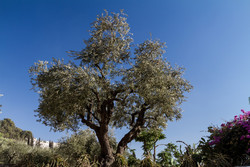Palestinians go green on the olive front
With over 7 million olive-bearing trees in Palestinian territories, cultivation of the olive tree plays an important part in the region's economy and culture. While the sector offers much potential for development, the disposal of untreated olive mill waste is harming the environment and groundwater, posing environmental challenges that must be urgently addressed. This was the goal of the EU-funded OLITREVA(opens in new window) (Capacity building for sustainable treatment and valorization of olive mill waste in Palestine) project. In addition to reinforcing the relevant research and development capabilities in Palestinian research centres, the project worked to overcome environmental hazards posed by olive-processing residues. It strengthened collaboration between the Applied Research Institute Jerusalem (ARIJ) and top-notch European research centres using a viable short-term and long-term research and cooperation strategy. OLITREVA's work involved evaluating current sector-related science and technology capabilities in the Palestinian territories and raising public awareness regarding environmental threats that result from olive mill waste. This created important lasting partnerships among the project partners built on specific joint activities. To achieve its aims, the project team identified key Palestinian research partners, outlining both their capabilities and needs. It also identified technical and non-technical barriers to research and technological development in the field. OLITREVA conducted research-based exchange visits between the Palestinian partners and their counterparts in Spain and Italy, two countries that have made appreciable progress in treating the waste. Among the project's main achievements is an online platform and database to increase the visibility of relevant Palestinian researchers and centres in the sector. The platform encourages networking, knowledge transfer and the exchange of best practices, in addition to disseminating data and results related to the project. Also noteworthy was the OLITREVA international conference held in Bethlehem, Palestine, in 2014 to promote the project's objectives and results. Overall, the work conducted during the project's lifetime has helped identify solutions for treating olive mill waste. It boosted professional growth for junior Palestinian scientists and researchers, providing opportunities for the Palestinian territories to participate in global projects. OLITREVA's outcomes are expected to enhance sustainability and contribute to improving both the Palestinian economy and the environment.



